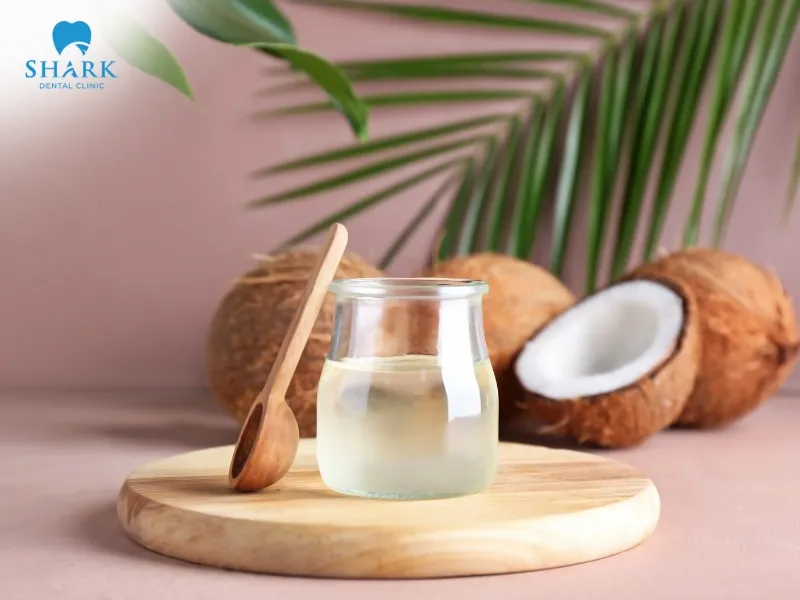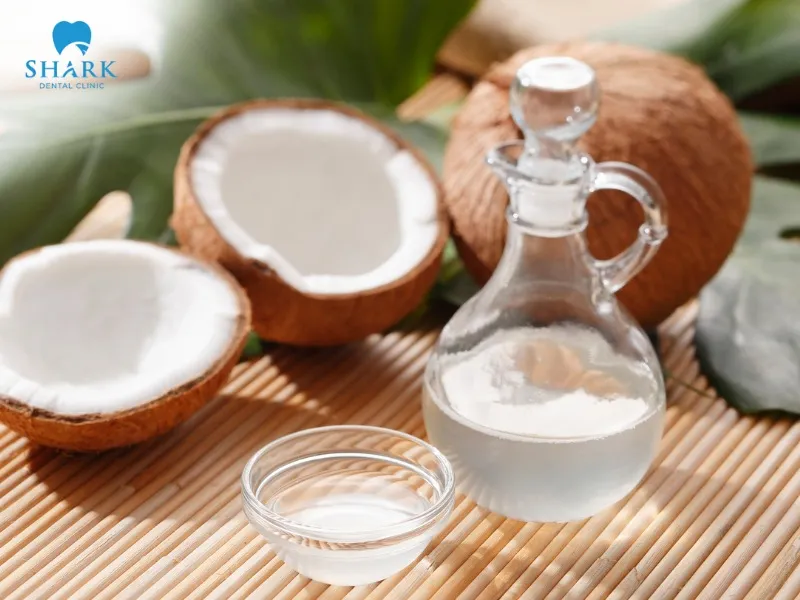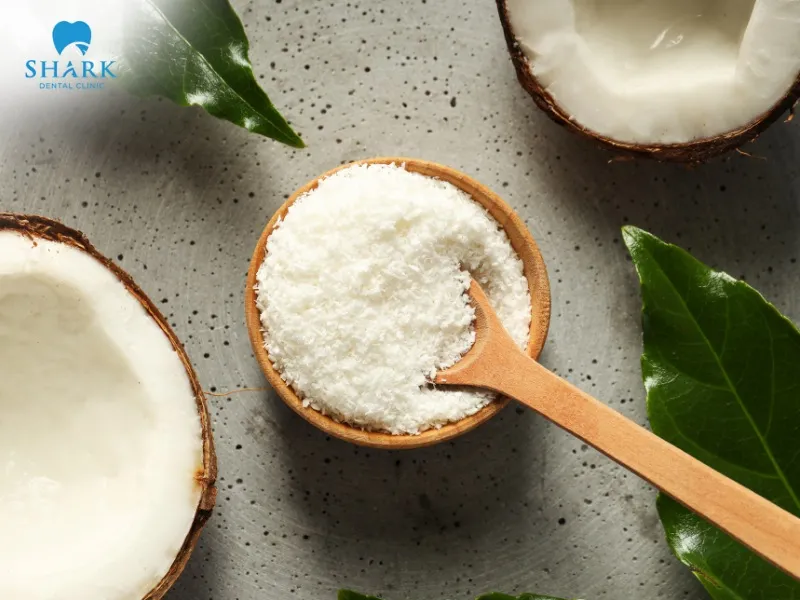In recent years, oil pulling with coconut oil for teeth whitening has gained popularity as a natural method. Besides brightening your smile, this method promotes oral cleanliness and helps prevent cavities, all while being completely safe. Let’s take a closer look at how to whiten teeth with coconut oil in the article below!
Where did coconut oil pulling come from?
Swishing coconut oil for teeth whitening is a traditional method that originated thousands of years ago in India’s Ayurvedic medicine. In ancient times, people used various types of vegetable oils, such as sunflower oil, sesame oil, or coconut oil, to cleanse their mouths and naturally brighten their teeth.
The mechanism behind this method relies on the oil’s ability to attract impurities, remove toxins, and eliminate food debris and bacteria from the mouth. This process helps maintain a clean oral environment, contributing to brighter, healthier, and more confident smiles.
Additionally, coconut oil contains a high concentration of lauric acid, a compound known for its antibacterial properties that can destroy bacterial cell membranes. When swishing coconut oil for teeth whitening is done correctly, it not only helps improve tooth brightness but also prevents tooth decay and gum inflammation.

Does coconut oil pulling whiten teeth?
While coconut oil does not have actual bleaching properties like professional whitening agents, it can help your teeth appear whiter and brighter when used properly. Known for its benefits in hair and skin care, coconut oil has recently become popular in oral hygiene routines as well.
Coconut oil contains lauric acid, which helps break down and remove yellowish plaque deposits on the surface of the teeth. When these discolored layers are removed, the natural white color of your enamel becomes more visible, making your smile look brighter and more even.
Moreover, coconut oil also contains monocaprin and monolaurin, substances with antifungal and antibacterial properties. These active ingredients help maintain healthy teeth and gums, reducing inflammation and the risk of infection. As a result, people who regularly practice coconut oil teeth whitening or oil pulling often enjoy stronger, healthier, and more radiant teeth.

Is coconut oil pulling safe?
Swishing coconut oil for teeth whitening is considered a safe and natural home remedy. It does not harm tooth enamel and is widely practiced by many people today. Coconut oil is plant-based and rich in beneficial properties such as antibacterial, anti-inflammatory, and oral-cleansing effects, making it a safe choice for maintaining dental health.
Here are some reasons to consider coconut oil pulling for stronger, whiter teeth:
- Coconut oil contains mild natural acids without harsh bleaching agents. It does not erode enamel or alter the mouth’s pH balance. When used in moderation, it cleans teeth effectively without irritating the gums.
- The lauric acid in coconut oil is a gentle, natural fatty acid that fights bacteria without damaging tooth enamel or soft oral tissues, making it suitable even for people with sensitive gums.
- Several studies have shown that coconut oil can inhibit bacterial growth in the mouth. Regular oil pulling helps keep the oral cavity clean and reduces the risk of gum disease, cavities, and bleeding gums.
In conclusion, oil pulling teeth whitening is a safe and natural approach to improving oral hygiene. However, if you have existing dental conditions, it is recommended to consult a dentist before starting to ensure the best results for your individual case.

How to use coconut oil for mouthwash?
Coconut oil is a well-known natural ingredient that can effectively whiten teeth when used in its pure form or combined with other natural ingredients for enhanced cleaning efficiency and oral health:
Pure coconut oil
Coconut oil helps remove leftover food particles and bacteria from the mouth, contributing to whiter teeth and fresher breath.
How to do it:
- Step 1: Prepare a cup of warm water and add 1–2 teaspoons of pure coconut oil. Stir well.
- Step 2: Dip your toothbrush into the mixture and gently brush all tooth surfaces.
- Step 3: Rinse your mouth with pure coconut oil for about 2–3 minutes, then rinse again with warm water to eliminate any residue.
Coconut oil and baking soda
Baking soda for teeth whitening very effectively. When combined with coconut oil, it helps clean teeth effectively, removes stubborn plaque, and brightens tooth enamel.
How to do it:
- Step 1: Put 1–2 teaspoons of pure coconut oil into a small bowl, then add 1 teaspoon of baking soda and mix well.
- Step 2: Dip your toothbrush into the mixture and gently brush all over your teeth and between the gaps for 2–3 minutes.
- Step 3: Rinse your mouth with diluted coconut oil to enhance the cleaning and whitening effect.
Coconut oil and turmeric powder
Turmeric contains curcumin, a natural compound with antibacterial and antioxidant properties that help reduce yellowish plaque buildup. When combined with coconut oil, it can help whiten and strengthen teeth.
How to do it:
- Step 1: Mix coconut oil and turmeric powder in a small bowl in a 2:3 ratio.
- Step 2: Apply the mixture evenly over your teeth and gently brush to ensure it reaches between your teeth and hard-to-reach areas.
- Step 3: Rinse thoroughly with warm water.
Coconut oil and baking powder
Combining coconut oil with baking powder creates a natural whitening paste that safely removes yellow stains from the tooth surface.
How to do it:
- Step 1: Add 1–2 teaspoons of coconut oil to a clean bowl, then add baking powder and stir until smooth.
- Step 2: Dip your toothbrush into the mixture and brush all surfaces for about 5 minutes.
- Step 3: Rinse your mouth with clean water or a specialized antiseptic mouthwash.

Can I brush my teeth with coconut oil every day?
It is not recommended to brush your teeth with coconut oil every day. Instead, you should incorporate regular brushing with fluoride toothpaste along with occasional coconut oil rinsing to improve oral hygiene. While coconut oil is a natural ingredient that helps clean the mouth, it does not contain fluoride, which is essential for preventing tooth decay. Therefore, dental experts recommend daily brushing with fluoride toothpaste and using coconut oil for teeth whitening as a supplementary step for cleaner, whiter, and healthier teeth, as well as fresher breath.
In conclusion, using coconut oil for teeth whitening and oral care is a safe and beneficial natural method. We hope this article helps you understand how to use coconut oil effectively for maintaining a bright, confident smile.
>>> See more: Dental bleaching in Vietnam









